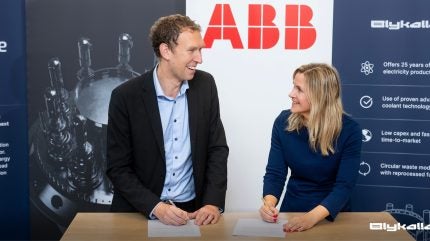
Swedish nuclear power company Blykalla has partnered with global engineering giant ABB to develop an electric SMR pilot facility in Oskarshamn, a town about 340km south of Stockholm.
The two companies signed an MOU to collaborate on the development of SMR technology to support Sweden’s clean energy and decarbonisation goals.

Discover B2B Marketing That Performs
Combine business intelligence and editorial excellence to reach engaged professionals across 36 leading media platforms.
The partnership will initially focus on constructing a “first-of-its-kind” electric testing facility for Blykalla’s SMR prototype SEALER-E, an electric lead-cooled fast reactor (LFR), to demonstrate the viability of future SEALER LFR plants. ABB will bring its expertise in automation, electrification and digitalisation to support the project.
“It is an electric, non-nuclear reactor, meaning we don’t split the atoms. We simulate the temperatures in the core that you would get for nuclear fission using electricity,” Blykalla CEO Jacob Stedman told Power Technology.
“We don’t split atoms in this testing facility because we want to test a number of things in the safety system, and it is much cheaper and faster to test that in a non-nuclear facility. If you actually have the nuclear fission process, the permitting takes much longer and the cost is much higher.”
Stedman explained that during his extensive career in software, he has come to believe in the “fail fast” methodology. “The faster you discover a problem, the cheaper and faster you can fix it… So, I think this makes a lot of sense [for the nuclear industry],” he says, recommending that all vendors try “iterative tests in a non-nuclear environment”.

US Tariffs are shifting - will you react or anticipate?
Don’t let policy changes catch you off guard. Stay proactive with real-time data and expert analysis.
By GlobalDataThe test reactor will run 100% on power, using an electrical wire to run a current through liquid lead to heat the lead to the right temperature. Although not equivalent in diameter, it will be the same height as a future nuclear vessel, “allowing for a full-scale simulation of the future reactor” despite not using any uranium, said Stedman.
Under the scope of the MOU, the two companies will also explore solutions to support future SEALER plants, including cybersecurity measures.
Due to their diminutive size, SMRs can be deployed in remote areas unsuitable for large-scale nuclear infrastructure. Think tank Chatham House predicts that with increased deployment in more locations, SMRs will have to depend on computer systems to run remotely instead of having staff at each site, increasing cybersecurity risks.
When asked about how the partnership will address this challenge, Stedman confirmed that Blykalla plans to have on-site staff at all of its sites to prevent such risks. “A completely remote system would be decades away,” he added.
Sweden is amid a significant nuclear expansion, with a government road map targeting up to 10GW of new nuclear capacity by 2045, a target that this partnership aims to help achieve. Nuclear energy currently provides around 30% of the country’s electricity.
“The energy transition is one of the greatest challenges but also opportunities of our time,” said ABB Energy Industries president Per Erik Holsten. “We are proud to build a partnership with Blykalla and use our automation and electrification knowledge to support the role of SMRs in producing clean electricity and driving decarbonisation.”
The partnership reflects a growing global interest in SMRs, which are seen as a more flexible and cost-effective alternative to traditional large-scale nuclear plants.



